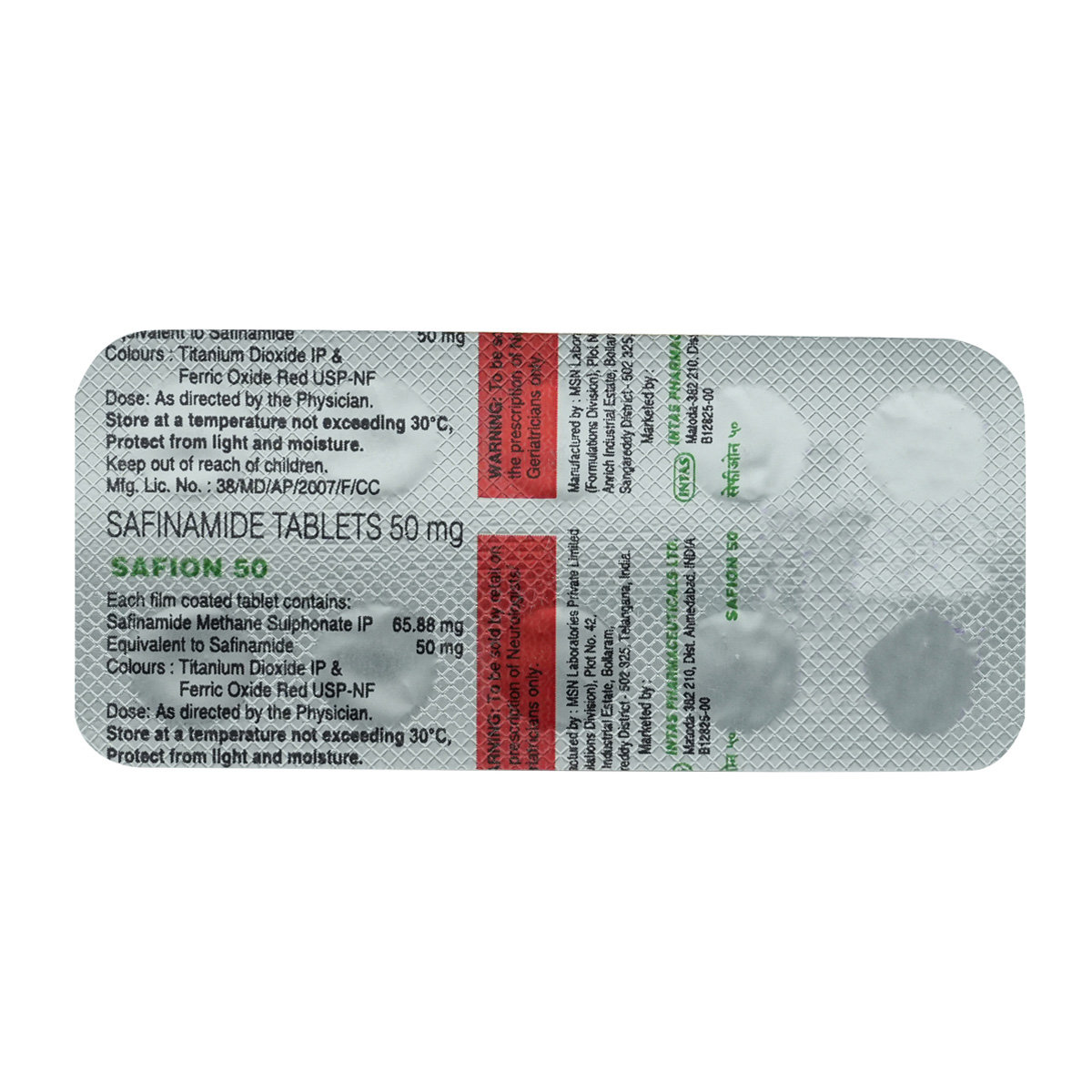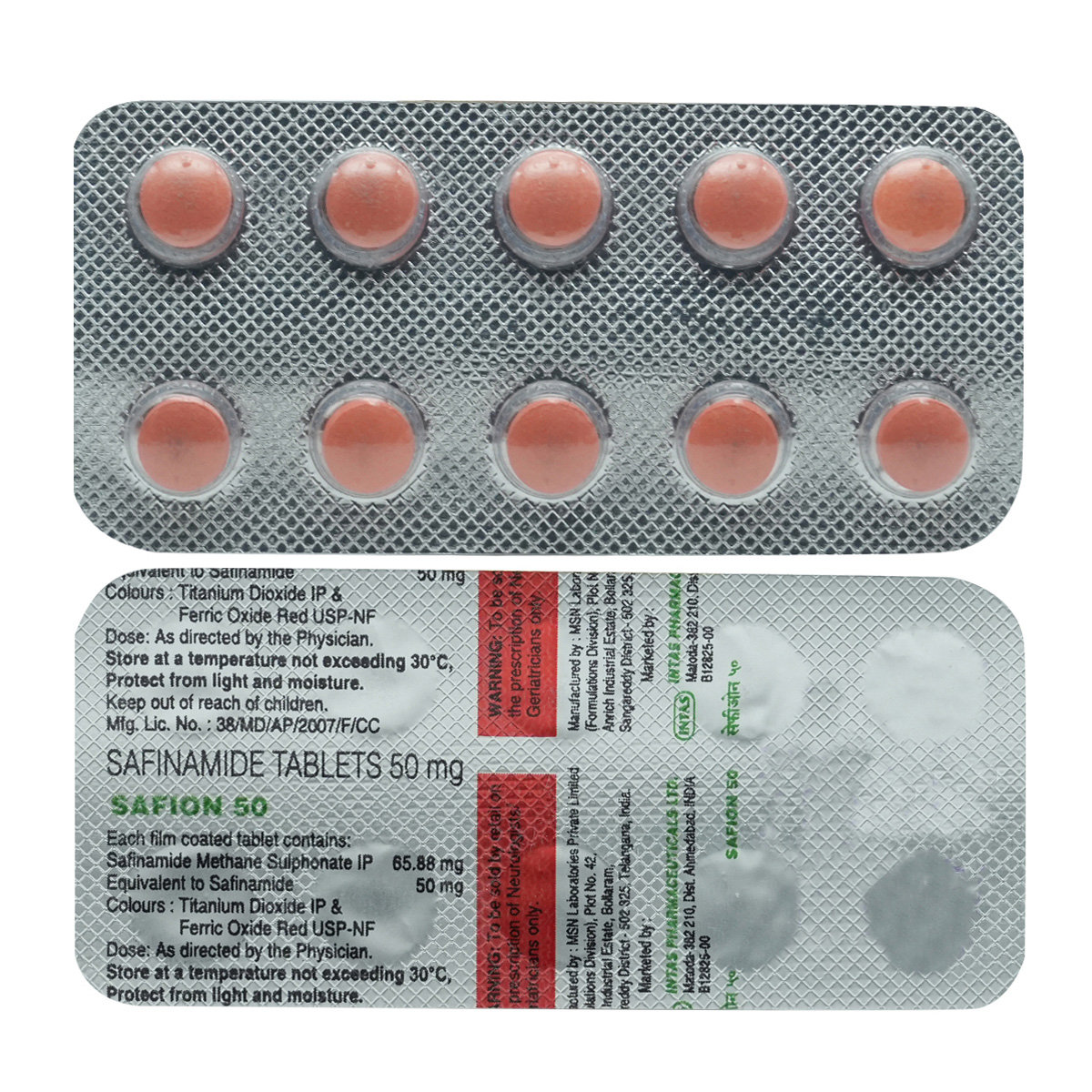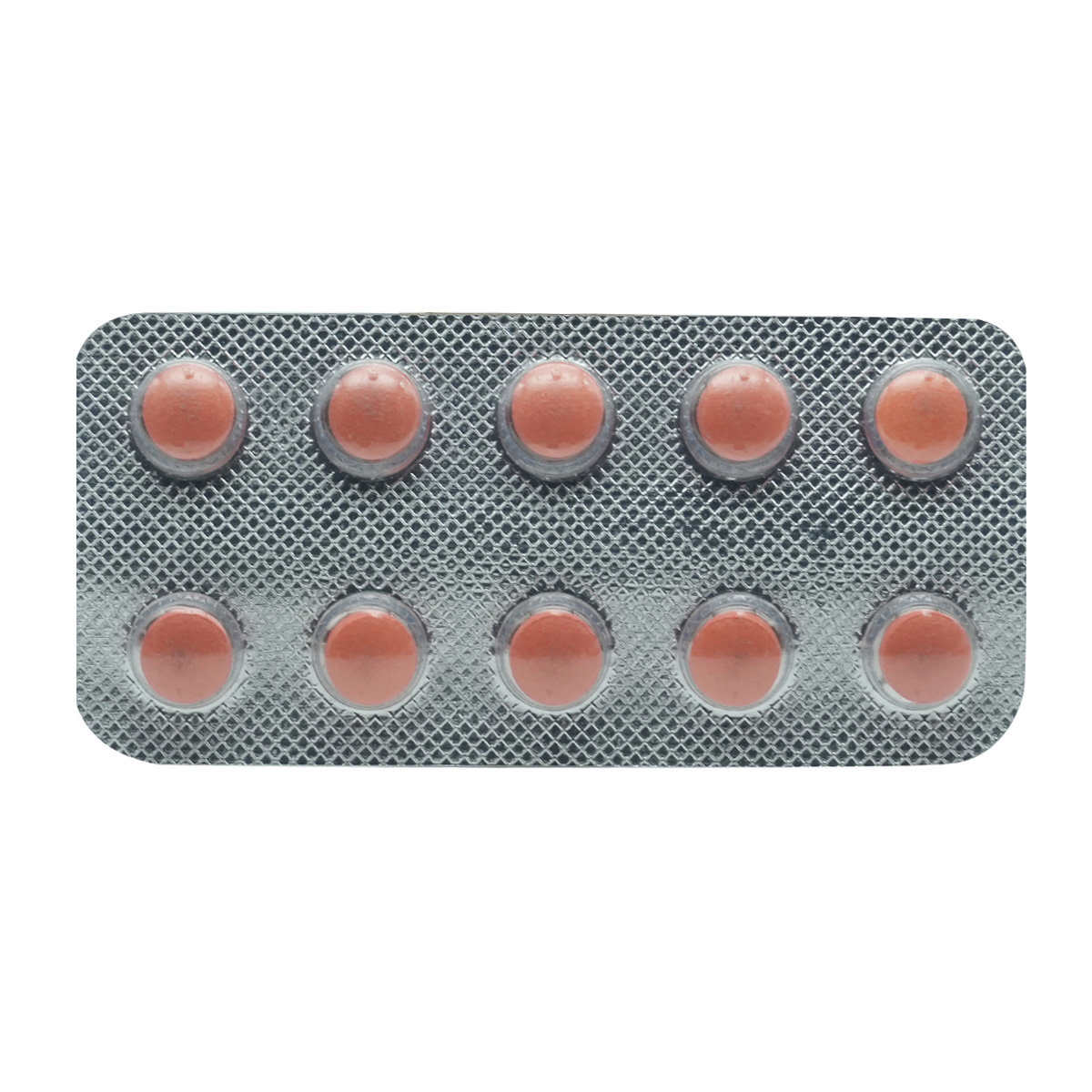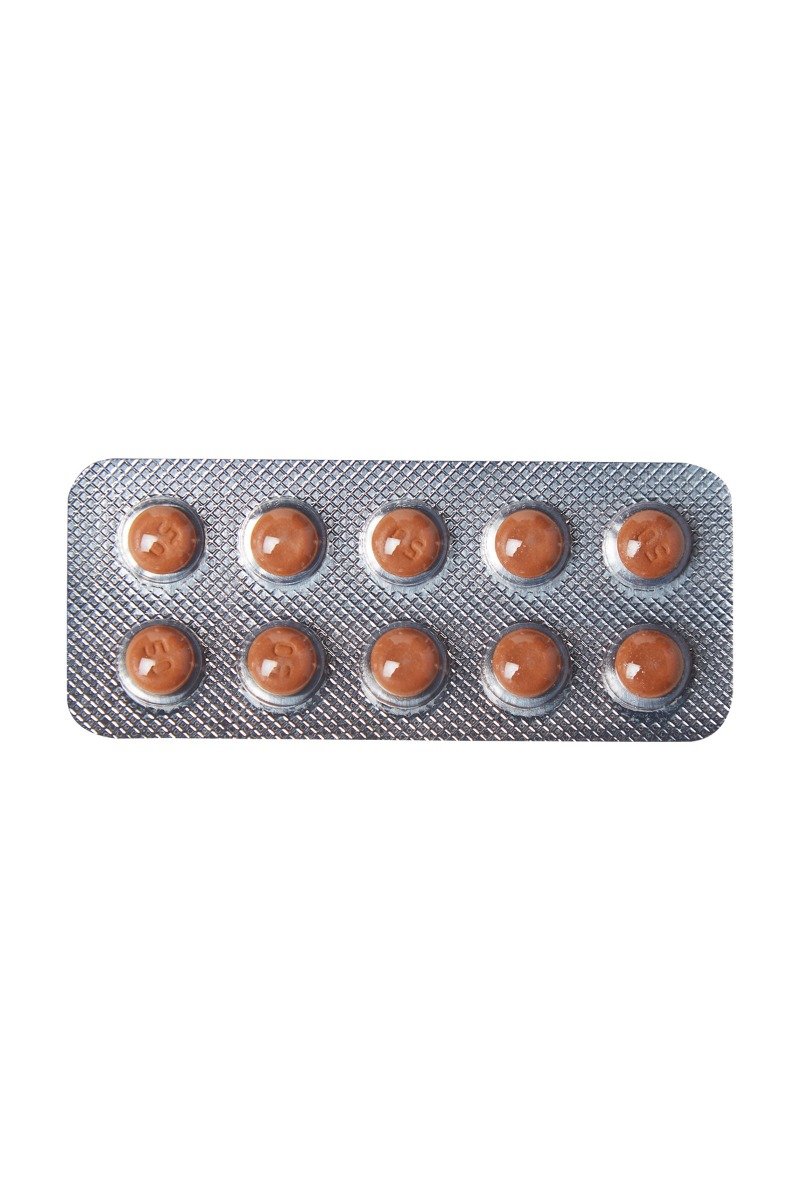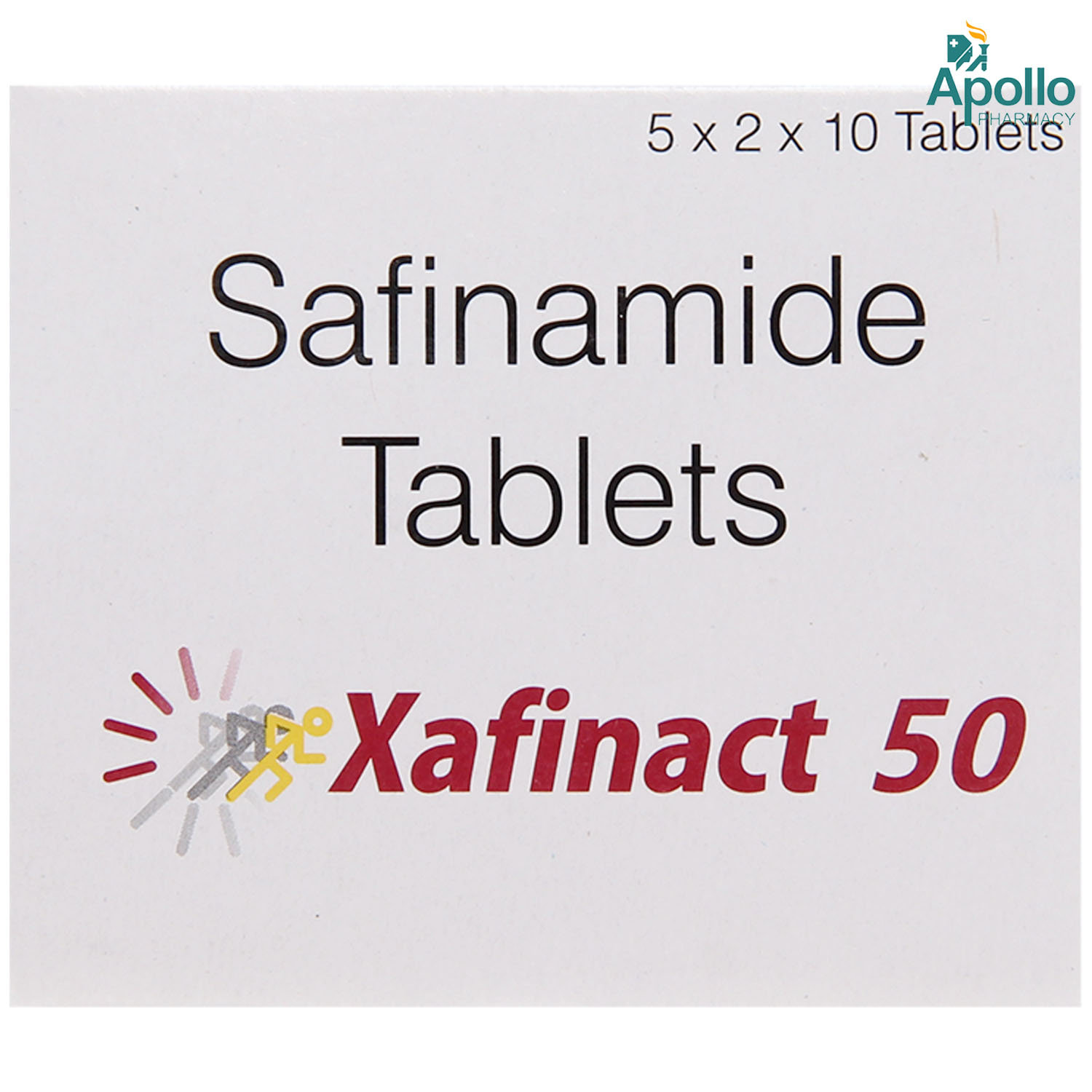Safion 50 Tablet 10's
MRP ₹160.5
(Inclusive of all Taxes)
₹24.1 Cashback (15%)
Provide Delivery Location
Online payment accepted
 Prescription drug
Prescription drugWhats That
Composition :
Manufacturer/Marketer :
Consume Type :
Expires on or after :
Return Policy :
About Safion 50 Tablet
Safion 50 Tablet belongs to a class of drugs called antiparkinson agents, which are used in combination with other drugs for the treatment of the signs and symptoms of Parkinson's disease. Parkinson’s disease is a disorder of the central nervous system that affects movement and locomotion. It causes stiffness, shaking, and difficulty in walking, coordination and balance.
Safion 50 Tablet contains 'safinamide', belonging to the group of medications called monoamine oxidase type B (MAO-B) inhibitors. It works by increasing the amount of dopamine (a natural substance that is needed to control movement) in the brain.
Safion 50 Tablet may cause common side effects like cough, depression, indigestion, flu-like symptoms, insomnia (difficulty sleeping), joint pain, and peripheral oedema. Most of these side effects of Safion 50 Tablet do not require medical attention and gradually resolve over time. However, if the side effects persist or worsen, please consult your doctor.
If you are known to be allergic to Safion 50 Tablet or any other medicines, please tell your doctor. Please inform your doctor if you are using any medications other than Safion 50 Tablet . If you are pregnant or breastfeeding, it is advised to inform your doctor. Safion 50 Tablet is not recommended in albinism, retinal degeneration, uveitis, inherited retinopathy or severe progressive diabetic retinopathy. Safion 50 Tablet should be used with caution in patients like schizophrenia (a mental illness that causes disturbed thinking, loss of interest in life, and strong or unusual emotions), bipolar disorder (mood that changes from depressed to abnormally excited), or psychosis; or if you have high or low blood pressure; dyskinesia (abnormal movements); or sleep problems. Safion 50 Tablet may cause serotonin syndrome when used with MAO inhibitors, antidepressants, or opioid drugs.
Uses of Safion 50 Tablet
Directions for Use
Key Benefits
Safion 50 Tablet belongs to a class of drugs called antiparkinson agents, which are used in combination with other drugs for the treatment of the signs and symptoms of Parkinson's disease. It works by increasing the amount of dopamine (a natural substance needed to control movement) in the brain. Thereby improving the symptoms of Parkinson’s disease.
Storage
- Uncontrolled and involuntary movements need immediate medical attention.
- Observe your movements and try to understand and control the particular movement.
- Regularly do strengthening exercises to improve blood flow throughout the body and avoid involuntary movements.
- Implement massage techniques to enhance blood flow to organs.
- Take a balanced diet and quit smoking.
- Practice yoga and meditation to improve thought processes and reduce uncontrolled and involuntary movements.
- Inform your doctor about the nausea and discuss possible alternatives to the medication or adjustments to the dosage.
- Divide your daily food intake into smaller, more frequent meals to reduce nausea.
- Opt for bland, easily digestible foods like crackers, toast, plain rice, bananas, and applesauce.
- Avoid certain foods that can trigger nausea, such as fatty, greasy, spicy, and smelly foods.
- Drink plenty of fluids, such as water, clear broth, or electrolyte-rich beverages like coconut water or sports drinks.
- Use ginger (tea, ale, or candies) to help relieve nausea.
- Get adequate rest and also avoid strenuous activities that can worsen nausea.
- Talk to your doctor about taking anti-nausea medication if your nausea is severe.
- Record when your nausea occurs, what triggers it, and what provides relief to help you identify patterns and manage your symptoms more effectively.
- Prepare for a restful night's sleep: Develop a calming pre-sleep routine, like reading or meditation, to help your body relax and prepare for sleep.
- Create a sleep-conducive Environment: Make bedroom a sleep haven by ensuring it is quiet, dark and calm.
- Follow a Sleep Schedule: Go to bed and get up at the same time every day to help regulate your body's internal clock and increase sleep quality.
- Try relaxing techniques like deep breathing, mindfulness meditation and any others.
- Limit stimulating activities before bedtime: Avoid stimulating activities before bedtime to improve sleep quality.
- Monitor Progress: Keep track of your sleep patterns to identify areas for improvement.
- Consult a doctor if needed: If these steps don't improve your sleep, consult a doctor for further guidance and therapy.
- Hydrate your body: Drink enough water to prevent dehydration and headaches.
- Calm Your Mind: Deep breathing and meditation can help you relax and relieve stress.
- Rest and Recharge: Sleep for 7-8 hours to reduce headache triggers.
- Take rest: lie down in a quiet, dark environment.
- Cold or warm compresses can help reduce tension.
- Stay Upright: Maintain good posture to keep symptoms from getting worse.
- To treat headaches naturally, try acupuncture or massage therapy.
- Over-the-counter pain relievers include acetaminophen and ibuprofen.
- Prescription Assistance: Speak with your doctor about more substantial drug alternatives.
- Severe Headaches: Seek emergency medical assistance for sudden, severe headaches.
- Frequent Headaches: If you get reoccurring headaches, consult your doctor.
- Headaches with Symptoms: Seek medical attention if your headaches include fever, disorientation, or weakness.
- Tell your doctor immediately if you experience symptoms of Nervousness, such as anxiety, jitteriness, or an increased heart rate, after taking medication or adjusting your medication regimen.
- Your doctor may adjust your medication regimen to alleviate symptoms of Nervousness. This can include switching to a different medication, reducing the dosage, or temporarily stopping the medication. Your doctor may also recommend alternative techniques like relaxation, mindfulness meditation, or journaling. These techniques can help reduce anxiety and Nervousness.
- Practice stress-reducing techniques, such as deep breathing exercises, yoga, or journaling, to help manage Nervousness.
- Engage in regular physical activity, such as walking or jogging, to help reduce anxiety and improve mood.
- Your doctor may advise considering cognitive-behavioural therapy (CBT) or other forms of talk therapy to address underlying anxiety or Nervousness.
- You should maintain regular follow-up appointments with your doctor to monitor nervousness symptoms, adjust treatment plans as needed, and discuss any concerns or questions.
- Pounding in the ears needs immediate medical attention when you hear abnormal sounds through your ears.
- Get a physical examination, and an ENT will help identify factors that led to ear pounding.
- Avoid anxiety and stress, as it can worsen your condition.
- Follow your doctor's instructions, and use a white noise machine to reduce the pounding sound in your ear. Soft music and low-volume radio can also help if there is no white noise machine.
- Take a balanced diet and limit your intake of caffeine, alcohol and nicotine.
Drug Warnings
If you are known to be allergic to Safion 50 Tablet or any other medicines, please tell your doctor. Please inform your doctor if you are using any medications other than Safion 50 Tablet . If you are pregnant or breastfeeding, it is advised to inform your doctor. Safion 50 Tablet is not recommended in albinism, retinal degeneration, uveitis, inherited retinopathy or severe progressive diabetic retinopathy. Safion 50 Tablet should be used with caution in patients like schizophrenia (a mental illness that causes disturbed thinking, loss of interest in life, and strong or unusual emotions), bipolar disorder (mood that changes from depressed to abnormally excited), or psychosis; or if you have high or low blood pressure; dyskinesia (abnormal movements); or sleep problems. Safion 50 Tablet should be used caution with liver diseases. Safion 50 Tablet may cause serotonin syndrome when used with MAO inhibitors, antidepressants or opioid drugs. A combination of MAOIs and dextromethorphan has been reported to cause episodes of psychosis or abnormal behaviour.
Drug-Drug Interactions
Drug-Drug Interactions
Login/Sign Up
Coadministration of Safion 50 Tablet with Fenfluramine can increase the risk of serotonin syndrome (A condition in which a chemical called serotonin increase in your body).
How to manage the interaction:
Taking Safion 50 Tablet with Fenfluramine is not recommended as it can possibly result in an interaction, but can be taken together if prescribed by a doctor. However, consult a doctor if you experience confusion, hallucination(seeing and hearing things that do not exist), fits, blood pressure alteration, increased heart rate, fever, excessive sweating, shivering or shaking, blurred vision, pain in the muscles or stiffness, incoordination, stomach cramps, nausea, vomiting, and loose stools. Do not discontinue any medications without consulting your doctor.
Taking Safion 50 Tablet with Tryptophan can increase the risk of serotonin syndrome (A condition in which a chemical called serotonin increase in your body).
How to manage the interaction:
Taking Safion 50 Tablet with Tryptophan is not recommended as it can possibly result in an interaction, but can be taken together if prescribed by a doctor. However, consult a doctor if you experience confusion, hallucination(seeing and hearing things that do not exist), fits, changes in blood pressure, increased heart rate, fever, excessive sweating, shivering or shaking, blurred vision, pain in the muscles or stiffness, incoordination, stomach cramps, nausea, vomiting, and loose stools. Do not discontinue any medications without consulting your doctor.
Taking Viloxazine with Safion 50 Tablet can increase the risk of high blood pressure.
How to manage the interaction:
Taking Safion 50 Tablet with Viloxazine is not recommended as it can possibly result in an interaction, it can be taken if your doctor has advised it. However, consult your doctor immediately If you experience symptoms such as headache, sleep disturbances, tremor(shaking of hands & legs), restlessness, nervousness, anxiety, palpitation, and rapid heartbeat. Do not discontinue any medications without first consulting your doctor.
Taking Safion 50 Tablet with Vortioxetine can increase the risk of serotonin syndrome (A condition in which a chemical called serotonin increase in your body).
How to manage the interaction:
Taking Vortioxetine with Safion 50 Tablet is not recommended as it can possibly result in an interaction, but can be taken together if prescribed by a doctor. However, consult a doctor if you experience confusion, hallucination(seeing and hearing things that do not exist), fits, changes in blood pressure, increased heart rate, fever, excessive sweating, shivering or shaking, blurred vision, pain in the muscles or stiffness, incoordination, stomach cramps, nausea, vomiting, and loose stools. Do not discontinue any medications without consulting a doctor.
Taking Safion 50 Tablet with Desipramine can increase the risk of serotonin syndrome (A condition in which a chemical called serotonin increase in your body).
How to manage the interaction:
Taking Safion 50 Tablet with Desipramine is not recommended as it can possibly result in an interaction, but can be taken together if prescribed by a doctor. However, consult a doctor if you experience confusion, hallucination(seeing and hearing things that do not exist), fits, blood pressure alteration, increased heart rate, fever, excessive sweating, shivering or shaking, blurred vision, pain in the muscles or stiffness, incoordination, stomach cramps, nausea, vomiting, and loose stools. Do not discontinue any medications without consulting your doctor.
Using Mirtazapine together with Safion 50 Tablet can increase the risk of serotonin syndrome (A condition resulting from the accumulation of high levels of serotonin in the body. Serotonin is especially a mood stabilizer).
How to manage the interaction:
Although using Safion 50 Tablet and Mirtazapine together may cause an interaction, they can be taken if prescribed by a doctor. Consult a doctor if you have symptoms such as confusion, hallucination, fits, blood pressure alteration, increased heart rate, fever, excessive sweating, shivering or shaking, blurred vision, pain in the muscles or stiffness, incoordination, stomach cramps, nausea, vomiting, and diarrhea. Inform a doctor if you have recently taken amitriptyline. Do not discontinue any medications without consulting a doctor.
Taking Safion 50 Tablet with Fentanyl can increase the risk of serotonin syndrome (a condition in which a chemical called serotonin increase in your body).
How to manage the interaction:
Taking Safion 50 Tablet with Fentanyl is not recommended as it can result in an interaction, but it can be taken together if prescribed by a doctor. However, consult a doctor if you experience confusion, hallucination(seeing and hearing things that do not exist), increased heart rate, fever, excessive sweating, muscle pain, stomach cramps, vomiting, and loose stools. Do not discontinue any medications without consulting your doctor.
Coadministration of Safion 50 Tablet with Imipramine can increase the risk of serotonin syndrome(a condition in which a chemical called serotonin increase in your body).
How to manage the interaction:
Taking Safion 50 Tablet and imipramine together is not recommended as it can result in an interaction, but they can be taken together if prescribed by a doctor. However, consult a doctor if you experience confusion, hallucinations (seeing and hearing things that do not exist), fits, blood pressure alteration, increased heart rate, fever, excessive sweating, shivering or shaking, blurred vision, pain in the muscles or stiffness, incoordination, stomach cramps, nausea, vomiting, and loose stools. Do not discontinue any medications without consulting your doctor.
Taking Safion 50 Tablet with Amitriptyline can increase the risk of serotonin syndrome (A condition in which a chemical called serotonin increase in your body).
How to manage the interaction:
Taking Doxepin with Safion 50 Tablet is not recommended as it can possibly result in an interaction, but can be taken together if prescribed by a doctor. However, consult a doctor if you experience confusion, hallucination(seeing and hearing things that do not exist), fits, blood pressure alteration, increased heart rate, fever, excessive sweating, shivering or shaking, blurred vision, pain in the muscles or stiffness, incoordination, stomach cramps, nausea, vomiting, and loose stools. Do not discontinue any medications without consulting your doctor.
Taking Safion 50 Tablet with Trazodone can increase the risk of serotonin syndrome (A condition in which a chemical called serotonin increase in your body).
How to manage the interaction:
Taking Safion 50 Tablet with Trazodone is not recommended as it can possibly result in an interaction, but can be taken together if prescribed by a doctor. However, consult a doctor if you experience confusion, hallucination(seeing and hearing things that do not exist), fits, blood pressure alteration, increased heart rate, fever, excessive sweating, shivering or shaking, blurred vision, pain in the muscles or stiffness, incoordination, stomach cramps, nausea, vomiting, and loose stools. Do not discontinue any medications without consulting your doctor.
Drug-Food Interactions
Drug-Food Interactions
Login/Sign Up
Pepperoni, Miso Soup, Natto, Ricotta, Salami, Shoyu, Shrimp, Stilton Cheese, Swiss Cheese, Tamari, Tempeh, Fish, Farm Cheese, Fava Beans, Fermented Seafood, Fermented Tofu, Gorgonzola Cheese, Chicken Liver, Chocolates, Cottage Cheese, Cream Cheese, Dried Sausage, Dry-Type Summer Sausages, Cheddar Cheese, Cashews, Camembert, Beef Liver, American Cheese, Almonds, Avocado
How to manage the interaction:
Eating tyramine containing foods while you are taking Safion 50 Tablet can raise your blood pressure levels. Avoid Tyramine containing food while on the treatment with Safion 50 Tablet. Consult your doctor immediately If you experience symptoms such as headache, sleep disturbances, tremor(shaking of hands & legs), restlessness, nervousness, anxiety, palpitation, and rapid heartbeat. Do not stop taking the medication without consulting a doctor.
Diet & Lifestyle Advise
- A balanced diet is essential to show improvement in Parkinson's disease, including grains and leafy foods, as this food is rich in vitamins, fibres, and minerals. With this food, one should also include dairy items, protein-rich nourishments, for example, meat and beans, and solid fats found in nuts, olive oil, fish, and eggs in their diet. However, limit the consumption of sugar.
- Avoid intake of high-protein foods like soy protein, fish, eggs, chicken, beef, and pork. Eat more whole-grain foods such as whole wheat bread, oatmeal, brown rice or pasta.
- Eat more fibre-rich foods to ease constipation.
- Drink plenty of water to avoid headaches due to dehydration.
- Avoid the consumption of alcohol as it may increase drowsiness.
Side Effects of Safion 50 Tablet
- Cough
- Depression
- Indigestion
- Flu-like symptoms
- Insomnia (difficulty in sleeping)
- Joint pain
- Peripheral oedema
Habit Forming
Therapeutic Class
All Substitutes & Brand Comparisons
RX
Zafimove 50 Tablet 10's
Torrent Pharmaceuticals Ltd
₹142.5
(₹12.83 per unit)
11% CHEAPERRX
Xafinact 50 Tablet 10's
Sun Pharmaceutical Industries Ltd
₹170.5
(₹15.0 per unit)
3% COSTLIER
Drug-Diseases Interactions
Drug-Diseases Interactions
Login/Sign Up
FAQs
Safion 50 Tablet works by increasing the amount of dopamine (a natural substance needed to control movement) in the brain. Thereby improving the symptoms of Parkinson’s disease.
Do not double the dosage to compensate for a missed one. One can skip the missed portion and take the next dosage at the standard time of the following day.
Yes, Safion 50 Tablet is not recommended in albinism (an inherited condition that causes a lack of colour in the skin, hair and eyes), retinal degeneration, uveitis (inflammation of the middle layer of the eye (uvea)), inherited retinopathy or severe progressive diabetic retinopathy.
Do not stop Safion 50 Tablet suddenly; it may cause side effects like confusion, stiff muscles and a high fever. So please consult your doctor before stopping the medicine.
Drug-Drug Interactions Checker List
- DICLOFENAC
- TRAMADOL
- FLUOXETINE
- BUPROPION
- AMITRIPTYLINE
- BALOFLOXACIN
- CIPROFLOXACIN
- CARBAMAZEPINE
- ROSUVASTATIN
- PITAVASTATIN
- PRAVASTATIN
- METHOTREXATE
- GLYBURIDE
- MEPERIDINE
- METHADONE
- PROPOXYPHENE
- ISOCARBOXAZID
- LINEZOLID
- METHYLENE BLUE
- MOCLOBEMIDE
- PHENELZINE
- PROCARBAZINE
- RASAGILINE
- SELEGILINE
- TRANYLCYPROMINE
- DEXTROMETHORPHAN
- TOPOTECAN
Special Advise
- Talk to your doctor if you develop hallucinations or other changes in your behaviour.
Disease/Condition Glossary
Parkinson’s disease: It is a disorder of the central nervous system that affects movement due to damage of nerve cells in the brain which reduces the levels of dopamine and leads to symptoms such as stiffness, tremor in one hand, shaking, difficulty in walking, coordination and balance. This condition can last for many years or life-long. Treatment with medicines and physiotherapy may help control the symptoms and provide a quality life for as long as possible.

Have a query?
Alcohol
Safe if prescribed
Safion 50 Tablet may cause excessive drowsiness with alcohol, decreasing alertness and affecting your vision.
Pregnancy
Consult your doctor
Safion 50 Tablet may be unsafe to use during pregnancy. Your doctor will weigh the benefits and potential risks before prescribing Safion 50 Tablet . Please consult your doctor before taking Safion 50 Tablet .
Breast Feeding
Consult your doctor
Safion 50 Tablet may be unsafe to use in breastfeeding mothers. Your doctor will weigh the benefits and potential risks before prescribing Safion 50 Tablet . Please consult your doctor before taking Safion 50 Tablet .
Driving
Safe if prescribed
Safion 50 Tablet may decrease alertness, affect your vision or make you sleepy and dizzy. Do not drive if these symptoms occur.
Liver
Consult your doctor
Safion 50 Tablet should be used with caution in patients with liver disease. A dose adjustment of Safion 50 Tablet may be needed. So please consult your doctor before taking Safion 50 Tablet .
Kidney
Consult your doctor
Safion 50 Tablet should be used with caution in patients with kidney disease. A dose adjustment of Safion 50 Tablet may be needed. So please consult your doctor before taking Safion 50 Tablet .
Children
Safe if prescribed
Safion 50 Tablet is not recommended for use in children under 12 years.

